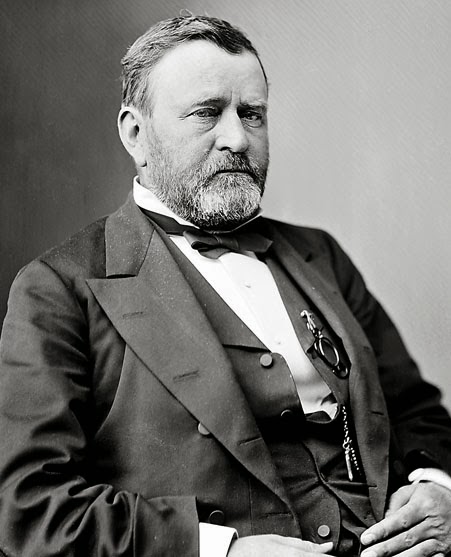Ulysses S. Grant commanded the Union armies during the American Civil War and was the 18th president of the United States. Hiram Ulysses Grant was born on April 27, 1822, in Point Pleasant, Ohio.
When his paperwork for admission to the Military Academy at West Point was submitted, the congressman submitting the paperwork made the mistake of listing his name as Ulysses Simpson Grant, which he never changed. Grant graduated 21st in his class of 39, was commissioned a second lieutenant on July 1, 1843, and was assigned to an infantry regiment.
During the Mexican-American War his regiment was initially attached to Zachary Taylor’s army, then to Winfield Scott’s army to capture Mexico City. Grant fought in all the major battles during the campaign and was breveted to captain. But his official rank was only raised to first lieutenant after the war.
  |
He married Julia Dent in August 1848 and served in several posts after the war, rising to the rank of captain in August 1853. Grant resigned his commission in July 1854 to return to his family. Grant tried several different business ventures and ended in business with his father and brothers in Galena, Illinois.
At the start of the Civil War he volunteered with the Illinois militia and was eventually given command of a regiment in July 1861. He was promoted to the rank of brigadier general in August.
He led a force against the Confederate forts of Henry and Donelson in February 1862. When he demanded the unconditional surrender of Fort Donelson, the northern newspapers dubbed him “Unconditional Surrender” (U.S.) Grant.
Grant spent much of 1863 attempting to capture Vicksburg, Mississippi. It was not until May 1863 that he was able to drive the Confederate army back into Vicksburg and lay siege to it. After almost two months, Vicksburg surrendered to him on July 4, 1863. With the fall of Vicksburg, Grant was promoted to major general.
 |
| attempting to capture Vicksburg |
In October he led a Union army that lifted the Confederate siege of Chattanooga, Tennessee. President Abraham Lincoln gave him command of all the Union armies and the job of bringing the war to an end. Grant joined the Army of the Potomac that was facing General Robert E. Lee’s Army of Northern Virginia.
Grant spent most of 1864 trying to destroy Lee’s army and finally settled into a siege at Petersburg, Virginia. Grant was able to trap Lee’s army during a breakout attempt, and he forced Lee to surrender at Appomattox Court House on April 9, 1865.
After the surrender of Lee’s army, the remaining Confederate armies also surrendered and brought the war to an end. Grant was rewarded by Congress with the revived rank of full general in July 1866.
   |
Grant ran for president in 1868 as a Republican and served two terms, from 1868 to 1876. Unfortunately, he was not much of a politician, and corruption was a problem during his administration, although Grant was not personally involved.
However, he also did not take a firm stance against corruption in his administration, favoring colleagues and friends despite mounting evidence of their corruption.
During his administration, Grant proposed the annexation of Santo Domingo both as a way to improve civil rights issues in the South and to attempt to force Cuba to abandon slavery. The measure was voted down in Congress, mainly due to the influence of Senator Charles Sumner
Grant’s inability to handle financial matters caused him problems after his terms as president, eventually causing him to go bankrupt. In order to try to pay off his debts and provide for his family, he wrote his memoirs, which turned out to be a great success. Suffering from throat cancer, Grant finished his memoirs days before he died on July 23, 1885.
